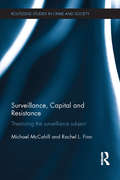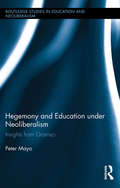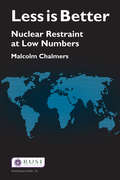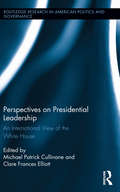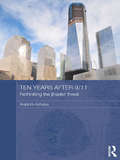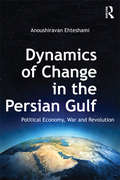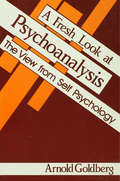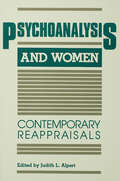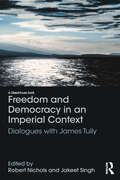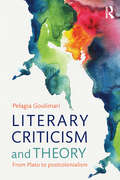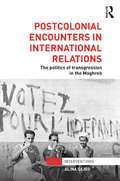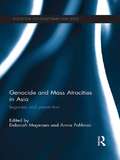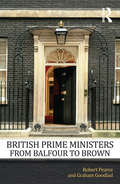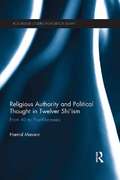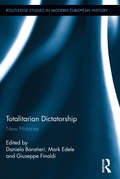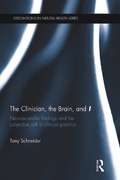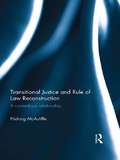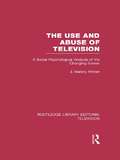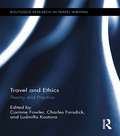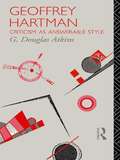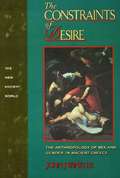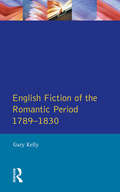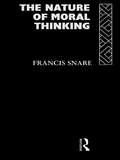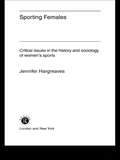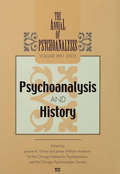Special Collections
Benetech’s Global Certified Accessible Titles
Description: Benetech’s GCA program is the first independent third-party EPUB certification to verify ebook accessibility. By creating content that is born accessible, publishers can meet the needs of all readers. Learn more: https://bornaccessible.benetech.org/
- Table View
- List View
Surveillance, Capital and Resistance
by Michael McCahill and Rachel L. FinnSurveillance, Capital and Resistance is a major contribution to current debates on the subjective experience of surveillance. Based on a large research project undertaken in a Northern City in the UK and focusing mainly on the use of surveillance in the context of policing and security, the book explores how a diverse range of social groups (‘school children’, ‘political protesters’, ‘offenders’, ‘unemployed people’, ‘migrants’, and ‘police officers’) experience and respond to being monitored by ‘new surveillance’ technologies such as CCTV surveillance cameras and computers. The book interweaves surveillance theory with the work of Pierre Bourdieu to argue that the distribution of various forms of ‘capital’ – economic, social, cultural and symbolic – in any given ‘field’ operate as a range of goods or resources that structure the dynamics of surveillance practices and power relations, including the ability to contest surveillance. The term surveillance capital is introduced to refer to the tacit knowledge and everyday forms of cultural know-how that allow surveillance subjects to contest surveillance in a variety of local and specific settings. The book is essential reading for anyone that might be interested in how people experience and respond to the new surveillance measures currently used in the crime control field. It will be key reading for students and academics interested in surveillance studies, childhood studies, media studies, criminal justice and migration studies.
Hegemony and Education Under Neoliberalism
by Peter MayoBased in a holistic exposition and appraisal of Gramsci’s writings that are of relevance to education in neoliberal times, this book--rather than simply applying Gramsci's theories to issues in education--argues that education constitutes the leitmotif of his entire oeuvre and lies at the heart of his conceptualization of the ancient Greek term hegemony that was used by other political theorists before him. Starting from this understanding, the book goes on to compare Gramsci's theories with those of later thinkers in the development of a critical pedagogy that can confront neoliberalism in all its forms.
Less is Better
by Malcolm ChalmersDespite the rise of ‘new’ security threats like terrorism, cyber-war and piracy, the terrible destructive power of nuclear weapons still hangs over the world. Discussion on further strategic nuclear arms reduction has tended to be dominated by the analysis of possible trade-offs between the US and Russia. But as the prospect of further cuts below ‘New START’ levels is contemplated, increasing attention needs to be paid to the possible shape of a new, multi-power approach to nuclear restraint. While restraint at low numbers goes with the grain of thinking in most nuclear states, correct sequencing will be vital. Using the New START framework, attention could initially be focused on incremental decreases in US and Russian stocks of the most dangerous weapons. Thereafter, the other nuclear powers would need to take steps to limit the size and capabilities of their own arsenals in a process of mutual reductions. If successful, the benefits would be wide ranging: successful restraint amongst existing nuclear-armed states could engender trust, as well as provide mechanisms for reducing the risks of rapid escalation in the event of limited conflict. Less is Better considers the various challenges and opportunities for ensuring restraint at low numbers in today’s complicated web of bilateral nuclear relationships and in the context of the debate on ‘Global Zero’.
Perspectives on Presidential Leadership
by Michael Patrick Cullinane and Clare Frances ElliottIn 2011 Barack Obama invited ten distinguished biographers to the White House to ask them one question: which past American president should I emulate? This was not the first time Obama asked scholars this, but the answer he received would differ as presidential legacies waxed and waned. In 2008 Obama chose Lincoln; in 2009, Reagan; and in 2010, Theodore Roosevelt. Perspectives on Presidential Leadership is an examination of presidential legacy, and in particular an analysis of the first ever UK ranking of American presidents which took place in 2011. In thirteen chapters, thirteen individual presidential administrations are assessed. Some presidents have been considered a success, others a failure; both types are featured in these thirteen case studies in a measured attempt to understand how the perception of presidential leadership evolves, shifts, and contorts across three centuries of American politics. The case studies also derive from the expertise of the collected British, Irish and Canadian authors, all of whom are leading scholars in their fields, and many of which took part in the 2011 survey. At a time when understanding presidential legacy is in high demand, this book offers a unique international perspective. Through extended commentary and inter-disciplinary study of the UK perspective it provides groundbreaking research.
Ten Years After 9/11 - Rethinking the Jihadist Threat
by Arabinda AcharyaTen years after the 9/11 attacks this book reassesses the effectiveness of the "War on Terror", considers how al-Qaeda and other jihadist movements are faring, explores the impact of wider developments in the Islamic world such as the Arab Spring, and discusses whether all this suggests that a new approach to containing international, especially jihadist, terrorism is needed. Among the book’s many richly argued conclusions are that the "War on Terror" and the invasions of Afghanistan and Iraq have brutalised the United States; that the jihadist threat is not one, but rather a wide range of separate, unconnected struggles; and that al-Qaeda’s ideology contains the seeds of its own destruction, in that although many Muslims are content to see the United States worsted, they do not approve of al-Qaeda’s violence and are not taken in by the jihadists’ empty promises of utopia.
Dynamics of Change in the Persian Gulf
by Anoushiravan EhteshamiThe Persian Gulf has come to represent one of the most strategically significant waterways of the world. In terms of geography, geopolitics, resources, global political economy, and regional influence, the Gulf is perhaps home to the world’s most significant group of countries. Focusing on the complexities of the interplay between domestic-level changes and region-wide interactions, this book presents the reader with the first comprehensive survey of the dynamics of change in this crucial area. Systemic-oriented in its approach, the impact of war and revolution on the countries of the sub-region is discussed, and the ways in which these factors have shaped the security dilemmas and responses of the Gulf States is also explored. The role of oil is examined in terms of the impact of its income on these states and societies, and the manner in which oil has shaped the integration of these states into the global system. Oil has shrunk developmental time in these countries, and has accelerated generational shift. At the same time, it has created the dialectical relationship which now characterizes the difficult balance between prosperity and instability which is at the heart of the sub-region. Casting new light on the workings of a strategically significant part of the international system, this book will be an essential resource for students and scholars of international relations, international security and Middle Eastern politics.
A Fresh Look at Psychoanalysis
by Arnold I. GoldbergGoldberg uses the questions posed by self psychology as point of entry to a thoughtful consideration of issues with which every clinician wrestles: the scientific status analysis, the relationships among its competing theories, the role of empathy in analytic method, and the place of the "self" in the analyst's explanatory strategies. Clinical chapters show how the notion of the self can provide organizing insights into little-appreciated character structures.
Psychoanalysis and Women
by Judith L. AlpertWithin the psychoanalytic framework, there is a growing body of research and thinking about female development. In addition, there is ongoing research within other areas of psychology, such as developmental psychology and social psychology, which has important implications for an understanding of women's adult development. Often these research findings are not readily available to the analytic community, nor has much of the research been incorporated into a psychoanalytic framework. Psychoanalysis and Women broadens analytic thinking by integrating contemporary literature from psychoanalysis with that of other areas, both within and outside psychology, which has implications for the undertanding of women's development. This literature is conceptualized within a psychoanalytic framework. A basic premise underlying this book is that psychoanalysis needs continuing review and revision in terms of what women and men are about and a continuing focus on whether and how unfounded biases prevent analysts from understanding patients. The present volume considers how sexism and feminism are affecting psychoanalysis and exemplifies how the emerging field of psychoanalysis of women and the issues its existence raises should be conceptualized. It also exemplifies some of the positive contributions that a feminist outlook gives to the study of human behavior and should esxpand the range of hypotheses that we have about people.
Freedom and Democracy in an Imperial Context
by Robert Nichols and Jakeet SinghFreedom and Democracy in an Imperial Context: Dialogues with James Tully gathers leading thinkers from across the humanities and social sciences in a celebration of, and critical engagement with, the recent work of Canadian political philosopher James Tully. Over the past thirty years, James Tully has made key contributions to some of the most pressing questions of our time, including: interventions in the history of moral and political thought, contemporary political philosophy, democracy, citizenship, imperialism, recognition and cultural diversity. In 2008, he published Public Philosophy in a New Key, a two-volume work that promises to be one of the most influential and important statements of legal and political thought in recent history. This work, along with numerous other books and articles, is foundational to a distinctive school of political thought, influencing thinkers in fields as diverse as Anthropology, History, Indigenous Studies, Law, Philosophy and Political Science. Critically engaging with James Tully’s thought, the essays in this volume take up what is his central, and ever more pressing, question: how to enact democratic practices of freedom within and against historically sedimented and actually existing relationships of imperialism?
Literary Criticism and Theory
by Pelagia GoulimariThis incredibly useful volume offers an introduction to the history of literary criticism and theory from ancient Greece to the present. Grounded in the close reading of landmark theoretical texts, while seeking to encourage the reader's critical response, Pelagia Goulimari examines: major thinkers and critics from Plato and Aristotle to Foucault, Derrida, Kristeva, Said and Butler; key concepts, themes and schools in the history of literary theory: mimesis, inspiration, reason and emotion, the self, the relation of literature to history, society, culture and ethics, feminism, poststructuralism, postcolonialism, queer theory; genres and movements in literary history: epic, tragedy, comedy, the novel; Romanticism, realism, modernism and postmodernism. Historical connections between theorists and theories are traced and the book is generously cross-referenced. With useful features such as key-point conclusions, further reading sections, descriptive text boxes, detailed headings, and with a comprehensive index, this book is the ideal introduction to anyone approaching literary theory for the first time or unfamiliar with the scope of its history.
Postcolonial Encounters in International Relations
by Alina SajedPostcolonial Encounters in International Relations examines the social and cultural aspects of the political violence that underpinned the French colonial project in the Maghreb, and the multi-layered postcolonial realities that ensued. This book explores the reality of the lives of North African migrants in postcolonial France, with a particular focus on their access to political entitlements such as citizenship and rights. This reality is complicated even further by complex practices of memory undertaken by Franco-Maghrebian intellectuals, who negotiate, in their writings, between the violent memory of the French colonial project in the Maghreb, and the contemporary conundrums of postcolonial migration. The book pursues thus the politics of (post)colonial memory by tracing its representations in literary, political, and visual narratives belonging to various Franco-Maghrebian intellectuals, who see themselves as living and writing between France and the Maghreb. By adopting a postcolonial perspective, a perspective quite marginal in International Relations, the book investigates a different international relations, which emerges via narratives of migration. A postcolonial standpoint is instrumental in understanding the relations between class, gender, and race, which interrogate and reflect more generally on the shared (post)colonial violence between North Africa and France, and on the politics of mediating violence through complex practices of memory.
Genocide and Mass Atrocities in Asia
by Deborah Mayersen and Annie PohlmanThe twentieth century has been labelled the ‘century of genocide’, and according to estimates, more than 250 million civilians were victims of genocide and mass atrocities during this period. This book provides one of the first regional perspectives on mass atrocities in Asia, by exploring the issue through two central themes. Bringing together experts in genocide studies and area specialists, the book looks at the legacy of past genocides and mass atrocities, with case studies on East Timor, Cambodia and Indonesia. It explores the enduring legacies of trauma and societal divisions, the complex and continuing impacts of past mass violence, and the role of transitional justice in the aftermath of mass atrocities in Asia. Understanding these complex legacies is crucial for the region to build a future that acknowledges the past. The book goes on to consider the prospects and challenges for preventing future mass atrocities in Asia, and globally. It discusses both regional and global factors that may impact on preventing future mass atrocities in Asia, and highlights the value of a regional perspective in mass atrocity prevention. Providing a detailed examination of genocide and mass atrocities through the themes of legacies and prevention, the book is an important contribution to Asian Studies and Security Studies.
British Prime Ministers From Balfour to Brown
by Robert Pearce and Graham GoodladThe origins of the post of Prime Minister can be traced back to the eighteenth century when Sir Robert Walpole became the monarch’s principal minister. From the dawn of the twentieth century to the early years of the twenty-first, however, both the power and the significance of the role have been transformed. British Prime Ministers from Balfour to Brown explores the personalities and achievements of those twenty individuals who have held the highest political office between 1902 and 2010. It includes studies of the dominant premiers who helped shape Britain in peace and war – Lloyd George, Churchill, Thatcher and Blair – as well as portraits of the less familiar, from Asquith and Baldwin to Wilson and Heath. Each chapter gives a concise account of its subject’s rise to power, ideas and motivations, and governing style, as well as examining his or her contribution to policy-making and handling of the major issues of the time. Robert Pearce and Graham Goodlad explore each Prime Minister’s interaction with colleagues and political parties, as well as with Cabinet, Parliament and other key institutions of government. Furthermore they assess the significance, and current reputation, of each of the premiers. This book charts both the evolving importance of the office of Prime Minister and the continuing restraints on the exercise of power by Britain’s leaders. These concise, accessible and stimulating biographies provide an essential resource for students of political history and general readers alike.
Religious Authority and Political Thought in Twelver Shi'ism
by Hamid MavaniRanging from the time of the infallible Imams, to the contemporary era, this book provides a comprehensive overview of Shi’i religious and political authority, focusing on Iran and Lebanon, without limiting the discourse to Khomeini’s version of an Islamic State. Utilising untapped Arabic and Persian sources, Hamid Mavani provides a detailed, nuanced, and diverse theoretical discussion on the doctrine of leadership (Imamate) in Shi’ism from traditional, theological, philosophical, and mystical perspectives. This theoretical discussion becomes the foundation for an analysis of the transmission of the Twelfth Imam’s religious and political authority vis-á-vis the jurists during his Greater Occultation. Bringing the often overlooked diversity within the Shi’i tradition into sharp focus, Religious Authority and Political Thought in Twelver Shi’ism discusses what constitutes an Islamic state, if there is such a notion as an Islamic state. Hamid Mavani further explores the possibility of creating a space for secularity, facilitating a separation between religion and state, and ensuring equal rights for all. This book argues that such a development is only possible if there is a rehabilitation of ijtihad. If this were to materialise modern religious, social, economic, political, and cultural challenges could be addressed more successfully. This book will be of use to scholars and students with interests ranging from Politics, to Religion, to Middle East Studies.
Totalitarian Dictatorship
by Mark Edele and Giuseppe Finaldi and Daniela BaratieriThis volume takes a comparative approach, locating totalitarianism in the vastly complex web of fragmented pasts, diverse presents and differently envisaged futures to enhance our understanding of this fraught era in European history. It shows that no matter how often totalitarian societies spoke of and imagined their subjects as so many slates to be wiped clean and re-written on, older identities, familial loyalties and the enormous resilience of the individual (or groups of individuals) meant that the almost impossible demands of their regimes needed to be constantly transformed, limited and recast.
The Clinician, the Brain, and 'I'
by Tony SchneiderThe clinician needs to make sense of many client experiences in the course of daily practice: do these experiences reflect the simple product of complex neurochemical activity, or do they represent another dynamic involving the subjective self? When research findings from the neurosciences are applied to clinical psychology, reductionist thinking is typically followed, but this creates problems for the clinical practitioner. In this book Tony Schneider draws together the three strands of philosophy, neuroscience, and psychology to explore the mind/body question as it affects the clinician. Taking a position more closely aligned with dualism, he argues for the utility in making distinctions between brain activity and ‘I’ – the subjective self – both in general psychological functioning and in psychopathology. Schneider considers traditional psychological topics contextualized by neuroscience research and the mind/body issue, as well as applying the ideas to various areas of clinical practice. Topics include: -the mind and body from the clinician’s perspective -fundamental aspects of the role and mechanics of the brain -the developing self and the relationship of ‘I’ with the self and with others -psychological functioning such as focus and memory, sleep and dreaming, and emotions and pain. The idea that ‘I am not my brain’ will resonate with many clinicians, and is systematically argued for in clinical literature and neuropsychology research here for the first time. The book will be of particular interest to psychologists, psychiatrists, counsellors and clinicians who wish to incorporate advances in neuroscience research in the conceptualization of their clinical work, and are looking for a working model that allows them to do so.
Transitional Justice and Rule of Law Reconstruction
by Padraig McAuliffeThis short and accessible book is the first to focus exclusively on the inter-relation between transitional justice and rule of law reconstruction in post-conflict and post-authoritarian states. In so doing it provides a provocative reassessment of the various tangled relationships between the two fields, exploring the blind-spots, contradictions and opportunities for mutually-beneficial synergies in practice and scholarship between them. Though it is commonly assumed that transitional justice for past human rights abuses is inherently conducive to restoring the rule of law, differences in how both fields conceptualise the rule of law, the scope of transition and obligations to citizens have resulted in divergent approaches to transitional criminal trial, international criminal law, restorative justice and traditional justice mechanisms. Adopting a critical comparative approach that assesses the experiences of post-authoritarian and post-conflict polities in Latin America, Asia, Europe and Africa undergoing transitional justice and justice sector reform simultaneously, it argues that the potential benefits of transitional justice are exaggerated and urges policy-makers to rebalance the compromises inherent in transitional justice mechanisms against the foundational demands of rule of law reconstruction. This book will be of interest to scholars in the fields of transitional justice, rule of law, legal pluralism and peace-building concerned by the failure of transitional justice to leave a positive legacy to the justice system of the states where it operates. ‘This is a bold and nuanced scrutiny of the international system’s approach to transitional justice and the much vaunted rule of law project. Dr McAulifee should be congratulated for this well-researched book which should be a must read for not only scholars and researchers in transitional justice and peace and conflict studies, but also policy-makers in the international system.’ Dr. Hakeem O. Yusuf, Senior Lecturer, University of Strathclyde and author of Transitional Justice, Judicial Accountability and the Rule of Law.
The Use and Abuse of Television
by J. Mallory WoberA critical review of the harms and benefits of television that also examines systems for maximizing television's benefits. The author breaks away from the conventional jargon of audience measurement and other traditional research methods, proposing instead new and alternative European and Australian methods of evaluating programming. Typical characterizations of the television screen – broadly defined to include television, home video, movies, games, programs and computers – as either the root of all social ills or the potential savior of society are reexamined. Wober's ultimately optimistic viewpoint seeks to trigger change in the way we think about and assess television and in turn ensure that screens will serve, rather than take advantage of, their users. Originally published in 1988, this thinking-piece concerns timeless issues still of import.
Travel and Ethics
by Charles Forsdick and Corinne Fowler and Ludmilla KostovaDespite the recent increase in scholarly activity regarding travel writing and the accompanying proliferation of publications relating to the form, its ethical dimensions have yet to be theorized with sufficient rigour. Drawing from the disciplines of anthropology, linguistics, literary studies and modern languages, the contributors in this volume apply themselves to a number of key theoretical questions pertaining to travel writing and ethics, ranging from travel-as-commoditization to encounters with minority languages under threat. Taken collectively, the essays assess key critical legacies from parallel disciplines to the debate so far, such as anthropological theory and postcolonial criticism. Also considered, and of equal significance, are the ethical implications of the form’s parallel genres of writing, such as ethnography and journalism. As some of the contributors argue, innovations in these genres have important implications for the act of theorizing travel writing itself and the mode and spirit in which it continues to be conducted. In the light of such innovations, how might ethical theory maintain its critical edge?
Geoffrey Hartman
by G. Douglas Atkins`The critic explicitly acknowledges his dependence on prior words that make his word a kind of answer. He calls to other texts "that they might answer him."' Geoffrey Hartman is the first book devoted to an exploration of the `intellectual poetry' of the critic who, whether or not he `represents the future of the profession', is a unique and major voice in twentieth-century criticism. Professor Atkins explains clearly Hartman's key ideas and places his work in the contexts of Romanticism and Judaism on which he has written extensively. In Geoffrey Hartman he provides a valuable introduction to a major critical voice who has called into question our assumptions about the distinction between commentary and imaginative literature.
The Constraints of Desire
by John J. WinklerFor centuries, classical scholars have intensely debated the "position of women" in classical Athens. Did women have a vast but informal power, or were they little better than slaves? Using methods developed from feminist anthropology, Winkler steps back from this narrowly framed question and puts it in the larger context of how sex and gender in ancient Greece were culturally constructed. His innovative approach uncovers the very real possibilities for female autonomy that existed in Greek society.
English Fiction of the Romantic Period 1789-1830
by Gary KellyEnglish Fiction of the Romantic Period 1789-1830 is the first comprehensive historical survey of fiction from that period for many decades. It combines a clear awareness of the period's social history with recent developments in literary criticism, theory and history, and explains the astounding variety of forms in Romantic fiction in terms of the various cultural, political, social, regional and gender conflicts of the time. It provides a broad-ranging survey from the major authors and works through to the sub-genres of the period. Jan Austin and Sir Alter Scott are discussed alongside the Gothic Romance, political and feminist fiction, social satire and regional, rural and historical novels. It also provides a comparison of the methods of distribution and marketing and the availability of books then and now; examines cheap popular fiction and children's fiction, and considers the recent debate about the place of prose fiction in a Romantic literature hitherto dominated by poetry.
The Nature of Moral Thinking
by Francis SnareThe Nature of Moral Thinking is an introductory text to the questions of ethics, offering a solid philosophical and historical basis for understanding the central issues. Francis Snare discusses in detail the classical philosophical arguments of Plato and Butler in relation to relativism and subjectivism and treats Marx and Nietzsche in regard to the origins and explanation of morality.
Sporting Females
by Jennifer Hargreaves1994 North American Society for the Sociology of Sport Annual Book AwardAn outstanding contribution to feminist analysis of sport from the nineteenth century to the present day. Jennifer Hargreaves views sport as a battle for control of the physical body and an important area for feminist intervention. Placing women at the centre of discussion, no other book is as comprehensive.
The Annual of Psychoanalysis, V. 31
by Jerome A. Winer and James William AndersonIn 1958 William L. Langer, in a well-known presidential address to the American Historical Association, declared the informed use of psychoanalytic depth psychology as "the next assignment" for professional historians. Psychoanalysis and History, volume 31 of The Annual of Psychoanalysis, examines the degree to which Langer's directive has been realized in the intervening 45 years. Section I makes the case for psychobiography in the lives of historical figures and exemplifies this perspective with analytically informed studies of the art of Wassily Kandinsky; the films of Stanley Kubrick; and the anti-Semitism of Adolf Hitler. Section II reviews Freud's own psychohistorical contributions and then considers the relevance to historical inquiry of the more recent perspectives of Winnicott, Kernberg, and Kohut. Section III explores an intriguing tributary of psychobiographical inquiry: the impact of the biographer's own subjectivity on his or her work. Section IV turns to a topic of perennial interest: the psychobiographical study of American presidents. Section V turns to the special challenges of applying psychoanalysis to topics of religious history and includes topical studies of religious figures as disparate as the 15th century Asian Drukpa Kunley and Osama bin Laden. Section VI focuses on the recent extension of psychohistorical inquiry to groups of people and to cultural phenomena more generally: an investigation of the youth movement in pre-Nazi Germany; consideration of how societies, no less than individuals, reenact and work through traumas over time; and an outline of the role of analysis in constructing a depth-psychological "social psychology" of use to historians. These papers, no less than those that precede them, are compelling testimony to the claim with which editors James William Anderson and Jerome A. Winer begin the volume, to wit, that "Psychoanalysis would seem to be a resource indispensable to the study of history."
